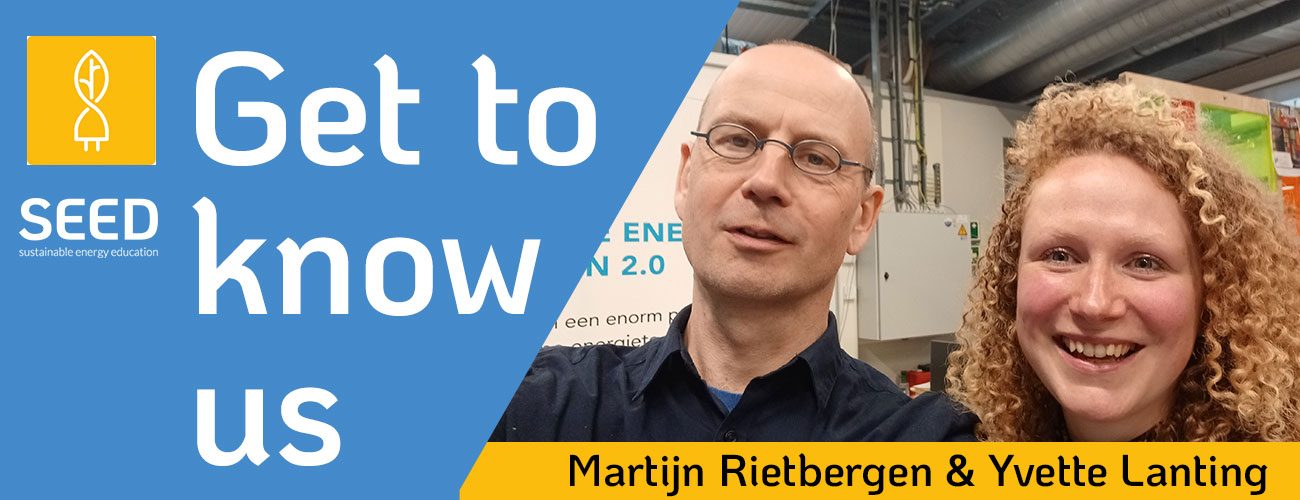Martijn Rietbergen and Yvette Lanting, Project Managers at the Hogeschool Utrecht (HU), who are also lead partners of SEED share their thoughts about the project and what SEED Community means to them. Don’t miss out that interview!
What motivated you to get involved in the SEED project?
The SEED project addresses two main challenges of our time: the energy transition and shortages on the labor market. We will work to innovate education in the field of sustainable energy. In collaboration with industry partners, companies, sector representatives and VET institutions we will identify the skills needs, closely linking our educational programs to the professional practice. We will create and develop networks to foster this continuous collaboration. This will make our courses on sustainable energy better attuned to the needs of the labor market. Being able to improve vocational education, is something we are very excited about. Especially when this will lead to better skilled students and professionals. This will help accelerating the energy transition which is not only necessary, but something we are proud of to contribute to.
What are your expectations for the project?
We expect that the project will lead to new partnerships amongst the five participating regions and also on a more local level within the regional CoVEs. While we connect existing initiatives and partnerships to the project, this will also inspire new collaborations. In The Netherlands for example, we have found that several industry partners are working on their own skill definition in the field of sustainable energy. Bringing together those partners within the SEED project, helps us to start working together and make use of each other’s frameworks. Furthermore, we expect that the project will inspire innovation. For example, when visiting the project campus in Bochum we were inspired by the Bobby Energy Hub project where a solar charged station for electric vehicles was built. Currently, we are exploring how such a project could be replicated in Utrecht. We expect that the exchange of good practices will inspire other regions to work on implementing this to their own region, thereby innovating the local practice. This is very exciting.
How do you think the project can contribute to developing the regional CoVE?
The SEED project provides an occasion for regional stakeholders to meet each other and learn from each other. In most regions there are regional networks already. The goal of SEED is not to start another network. Instead SEED will connect those existing initiatives to make these connections more explicit. SEED will provide a platform for regional stakeholders to share their knowledge of the professional practice and their experience on for example work-based learning or public private partnerships. This will bring the regional CoVE closer together and more involved. We believe that the SEED project is another reason for stakeholders to come together and realize their shared interests.
What does the term “SEED Community” mean?
The SEED community consists of a wide variety of stakeholders. Teachers and students in sustainable energy are part of our community. There are the partner institutions who work together on the project deliverables. Furthermore, there is a large group of institutions around these partners who provide their expertise and networks that are fundamental to developing and innovating sustainable energy education. Therefore we perceive the SEED community as a network of people and institutions interested in and working together on improving sustainable energy education. Essential to the SEED community is that you do not need to be a member of the consortium to be part of it. Instead we are a network where everyone can become involved.
How does the project involve the local community in decision making?
We involve the local community by making them part of our regional CoVE network. This network is part of our discussions on skills, will help us to decide how to develop the network and what the main focus should be, affecting which good practices from other regions will be adopted. The network is also involved in implementing those good practices. The good practices range from teaching and learning practices, to those focused on cooperation and partnerships and practices concerned with governance and financing. The CoVE network is therefore very much responsible for developing the CoVE. As we continue to evaluate our approach, the network has a major impact on the direction it will take. The network is shaped by the local community who jointly decide on the actions necessary within the CoVE.

